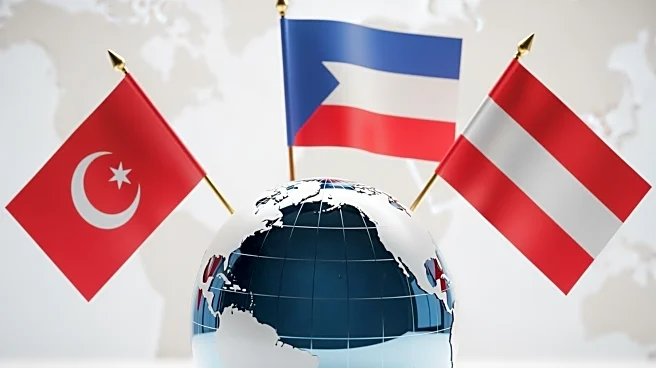What's Happening?
Russian envoy Dmitriev has stated that the United States, Ukraine, and Russia are nearing a diplomatic solution to the ongoing conflict in Ukraine. Despite Russia's rejection of an immediate ceasefire
proposal earlier in the week, Dmitriev expressed optimism that a resolution is 'reasonably' close. This development follows a meeting between US President Trump and Russian President Vladimir Putin at Joint Base Elmendorf-Richardson in Anchorage, Alaska, where discussions focused on negotiating an end to the war. The meeting signifies a potential shift in the diplomatic landscape, as both leaders engage in direct talks to address the conflict.
Why It's Important?
The potential diplomatic solution to the Ukraine conflict is significant as it could lead to a reduction in hostilities and pave the way for peace in the region. The involvement of President Trump and President Putin in direct negotiations underscores the importance of US-Russia relations in resolving international conflicts. A successful diplomatic resolution could stabilize Eastern Europe, reduce military tensions, and potentially lead to economic recovery in Ukraine. It also highlights the role of diplomacy in addressing complex geopolitical issues, offering a path forward that avoids further escalation.
What's Next?
If a diplomatic solution is reached, the next steps would likely involve formal agreements and commitments from all parties to ensure lasting peace. This could include ceasefire arrangements, withdrawal of troops, and international monitoring to enforce compliance. The international community, including the United Nations and European Union, may play a role in supporting and verifying the peace process. Additionally, rebuilding efforts in Ukraine could commence, focusing on infrastructure and economic development to recover from the impacts of the conflict.
Beyond the Headlines
The pursuit of a diplomatic solution raises questions about the long-term implications for US-Russia relations and the balance of power in Eastern Europe. It may also influence global perceptions of diplomatic strategies in conflict resolution, potentially setting a precedent for future negotiations in other regions. The ethical considerations of negotiating with Russia, given its actions in Ukraine, could spark debate about the moral responsibilities of international diplomacy.









